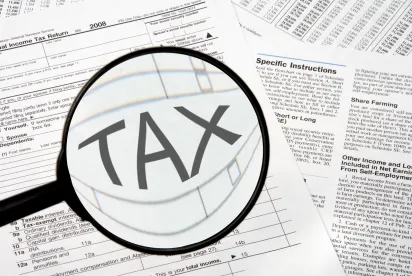The Bipartisan Budget Act of 2015, signed into law on November 2, 2015, has significantly changed the partnership tax audit rules, effective for tax years beginning after December 31, 2017.
Under the current partnership audit rules, after an audit adjustment, the IRS must separately assess and collect tax from each partner. For large partnerships in particular, this can be a lengthy and administratively burdensome process for the IRS.
The new rules will impose an entity-level tax on a partnership that is subject to an audit adjustment (plus interest and penalties, as applicable). Unlike prior legislative proposals, however, partners will not be jointly and severally liable for the entire audit tax liability. The partnership will not be able to deduct this entity-level tax (or any associated interest or penalties). The partnership's tax liability initially is calculated by multiplying all net adjustments by the highest marginal federal rate (currently, 39.6%). The partnership may then take certain actions to try to reduce this initial calculation (described in more detail below), or the partnership may elect for each of its partners to pay their respective shares of the tax, rather than the partnership itself. In either case, the burden of the partnership audit will shift significantly from the IRS to the partnership, which may dramatically increase the number of partnership audits by the IRS.
Reducing Initial Tax Calculation. A partnership's tax liability can be reduced if (1) partners file amended returns to reflect the partnership's audit adjustments (for all affected tax years), (2) the partnership demonstrates that adjustments would be allocable either to tax-exempt or non-U.S. partners who would not be taxable on those allocations, (3) the partnership demonstrates that adjustment allocations would benefit from preferential rates (i.e., capital gain or qualified dividend income allocable to an individual or ordinary income allocable to a corporation), or (4) otherwise determined by future guidance.
Election to Shift Tax Payment to Partners. As mentioned above, a partnership can elect for each of its partners to pay their respective share of the audit tax liability. The partnership must issue a statement to each partner with the information necessary for each partner to calculate such partner's tax liability resulting from the audit. If the partnership elects this "flow-through" option, interest and penalties are also assessed at the partner level, but with interest payable at a rate that is 2% higher than the generally applicable rate.
Limited Ability to Opt Out of the New Rules. Partnerships can elect to opt-out of the new rules if they have 100 or fewer partners consisting exclusively of individuals, corporations or estates. Any partnership with even a single partner (whether a limited partner or the general partner) that is a partnership for U.S. tax purposes cannot opt out. Accordingly, virtually all private investment funds will be subject to these new rules.
Partnership Representative to Bind All Partners. The new rules also repeal the various participation rights and procedural safeguards currently enjoyed by many partners in partnership-level administrative and judicial proceedings. Instead of appointing a "tax matters partner," partnerships must designate a partnership representative who need not be a partner but who must have a "substantial presence" in the United States. The new rules grant the partnership representative the sole authority to act for and bind the partnership (and its partners) in all IRS disputes.
Former Partners may Escape Liability. If a partner transfers its interest before a partnership tax audit, the transferee will indirectly bear the burden of any tax liability paid by the partnership, even if the audit was in respect of a prior year. However, if the partnership elects for its partners to pay the tax liability, the transferor will be liable.
Amending Partnership Agreements. The new rules also raise a number of issues for partners, many of which will need to be addressed through new provisions in partnership agreements. Such issues include the following:
-
Who will be the partnership representative?
-
Who will determine whether the partnership pays any audit tax liability or whether the election is made to shift the burden to the partners?
-
If the partnership pays an audit tax liability, how will the economic burden be shared among the partners?
-
Will a partnership require its partners to provide information to the partnership or to file amended returns in order to reduce the amount of any audit tax liability?
-
What rights will partners have regarding tax disputes? Absent contractual protections, the statute now gives full authority to the partnership representative.








 />i
/>i

